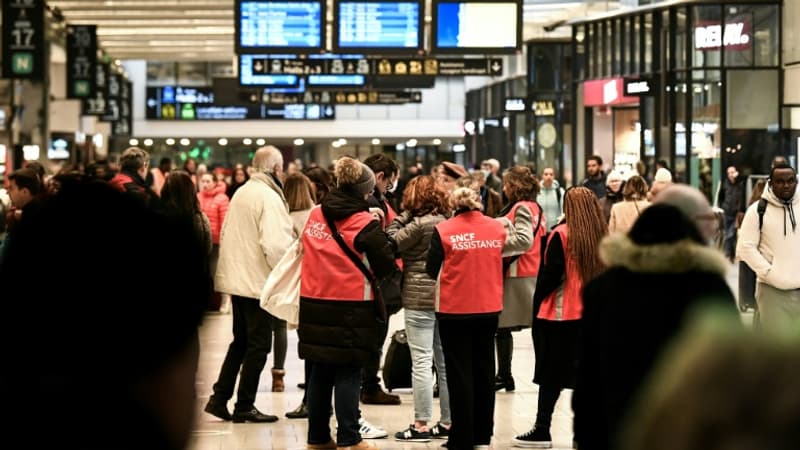The SNCF unions leave it up to each controller to join or not join the movement launched by a group of non-unionized controllers. No leader officially represents this movement of the captains, the official name of the controllers, as indicated by a striker speaking on BFMTV with his face covered and without giving his identity.
The unions do not supervise the movement, but they carry their demands and present strike notices. Since November, the leadership has struggled to establish a dialogue with the collective of controllers at the origin of the social movement. How many? It’s hard to know exactly, but on Facebook, the national collective ASCT (CNA) brings together more than 3,500 members of 10,000 controllers.
Cannot assess impact
This strategy creates great uncertainty for travelers intending to take the train over Christmas and New Year weekends, as it is impossible for management to assess the impact of the move and organize. But for Denis, it will also be followed at the beginning of December. From December 2 to 5, the SNCF had to cancel 60% of its TGV and Intercités. This catastrophic scenario is likely to repeat itself over the two holiday weekends. It could even be more important.
Indeed, without these sworn agents, no train can run. For a train to work, three agents are needed: a controller, an engineer and a signalman. If one of these three is missing, the output is not possible.
On trains, the role of controllers is to control passenger tickets and make reports, but not only. On the platforms they help to guarantee the correct operation of the equipment and ensure compliance with safety instructions and timetables. According to Pôle Emploi, the salary at the start of the career is 1600 euros gross per month without bonuses.
The collective calls for a better recognition of the specificity of this profession. During a meeting on December 8 with the management in which he was represented by the unions Sud-Rail, Unsa-Ferroviaire, CGT-Cheminots and CFDT-Cheminots, the management proposed to increase his “work bonus” by 600 euros per year, part that it would be included in his salary in 2024, as well as an additional allowance of 600 euros gross per year.
fragile social climate
These measures are of “a very good level and respond to the demands of the CNA,” Unsa-Ferroviaire estimated this Friday, announcing the withdrawal of its notice of strike. But the CNA, which wanted to organize an online consultation, could not find a clear position.
He then entrusted the unions “to organize votes among their controlling members, in order to take a position on whether or not to continue the movement.”
SUD-rail therefore “organized a consultation of all its structures” but this “did not make it possible to reach a majority position”, it acknowledged on Monday. As a result, the union decided to keep its notice to leave the door open to potential strikers, although it did not openly call for a strike. The same on the CGT-Cheminots side.
The social climate remains fragile at SNCF as the 2023 salary increase proposals formulated by management on December 7 during the annual mandatory negotiations (NAO), were only signed by one union, the CFDT, out of four.
Management has proposed a series of measures that lead, according to her, to a salary increase of 5.9% on average, including a general increase of 2% for everyone. Measures considered insufficient by the CGT, Unsa and SUD-Rail. The SNCF must communicate this Tuesday early in the afternoon a first traffic forecast for this weekend.
Source: BFM TV


